#Pilot Training in Canada
Explore tagged Tumblr posts
Text

Start your journey to becoming a pilot right after finishing 12th grade with Flying Star Aviators. This simple guide will show you the steps you need to take, from choosing the right training program to understanding the requirements and applying. You'll learn about the different licenses you can get, like the Private Pilot License (PPL) and Commercial Pilot License (CPL). We'll also explain the costs, scholarships, and the excellent facilities at Flying Star Aviators. With expert instructors and top-notch training, Flying Star Aviators will help you achieve your dream of flying. Contact us at +91-8178366070 & https://flystar.co.in
#how to become a pilot#how to become a pilot after 12th#how to become a pilot in india#pilot training#pilot#best pilot training#commercial pilot#airline pilot salary#dgca ground classes#dgca cpl classes#pilot requirements#atpl#pilot training in australia#pilot training in india#pilot training in new zealand#pilot training in canada
1 note
·
View note
Text
How to Choose the Best Aviation School in Canada?
Numerous of best pilot training schools in Canada offer top instruction worldwide. If you dream of becoming a pilot, choosing the right school is important to your career in flying. Below are some valuable tips to help you find the best aviation school to fly your profession into. 1. Check Accreditation & Certifications The first step one must take is to ensure that Transport Canada accredits…
#aviation school in canada#aviation training schools in canada#best aviation school in canada#best aviation training schools in canada#best flight pilot training schools in canada#best pilot training schools in canada#flight pilot training schools in canada#pilot training schools in canada
0 notes
Text
Elevate Your Skills with an Advanced Drone Training Course and SFOC Course Online
The drone industry has rapidly evolved, becoming an integral part of various sectors, including agriculture, real estate, filmmaking, and emergency services. As drone technology advances, so too does the need for qualified operators who can navigate the complexities of regulations, safety, and operational efficiency. In Canada, Transport Canada sets forth specific requirements for drone pilots, especially those looking to conduct complex operations. This article will explore the benefits of enrolling in an Advanced Drone Training Course and the significance of completing an SFOC Course Online, ensuring that you meet the regulatory requirements while enhancing your skills.
Understanding Advanced Drone Training
An Advanced Drone Training Course is designed for those who have already obtained their Basic Pilot Certificate and wish to expand their knowledge and skills for more complex drone operations. This course goes beyond the basics, preparing pilots to handle a variety of challenging scenarios, including flying in controlled airspace, operating over people, and conducting aerial inspections or surveys.
Key Components of an Advanced Drone Training Course
Regulatory Knowledge: Advanced courses cover the Canadian Aviation Regulations (CARs) in depth, focusing on the sections relevant to advanced operations. Understanding these regulations is crucial for compliance and safety.
Airspace Management: Pilots learn how to navigate different airspace classifications and understand the communication protocols necessary when flying in controlled airspace. This includes working with air traffic control (ATC) when required.
Risk Management: Safety is paramount in drone operations. Advanced training includes risk assessment techniques, emergency response strategies, and how to conduct thorough pre-flight and post-flight checks.
Flight Operations: The course offers practical flying experience, allowing pilots to practice advanced maneuvers and scenarios under the guidance of experienced instructors. This hands-on experience is invaluable for building confidence and competence.
Technical Skills: Pilots gain insights into the latest drone technologies and software, including flight planning applications, mapping tools, and data analysis software. Familiarity with these technologies enhances operational efficiency and effectiveness.
The Importance of SFOC Course Online
For drone operators wishing to engage in advanced operations, obtaining a Special Flight Operations Certificate (SFOC) is often a necessary step. An SFOC is a regulatory requirement for specific drone flights that fall outside the standard regulations.
What is an SFOC?
An SFOC is a permit issued by Transport Canada that allows drone operators to conduct flights that do not comply with the standard requirements for Basic and Advanced Pilot Certificates. This includes operations such as flying in controlled airspace, flying over crowds, or conducting experimental flights.
Benefits of Taking an SFOC Course Online
Comprehensive Understanding of Regulations: An SFOC Course Online provides a thorough overview of the regulatory framework surrounding special flight operations. This knowledge is critical for ensuring compliance and understanding the application process.
Application Guidance: The course typically includes step-by-step guidance on how to complete the SFOC application. This includes information on what to include in your application, how to outline safety measures, and how to demonstrate your understanding of risk management.
Safety Protocols: An SFOC course covers essential safety measures specific to high-risk operations. This includes emergency procedures, risk assessments, and how to mitigate potential hazards during flights.
Flexibility and Accessibility: Online courses offer the flexibility to learn at your own pace, making it easier to fit education into your schedule. This is especially beneficial for those balancing work or other commitments while pursuing advanced drone training.
Enhanced Employability: Completing an SFOC course online, alongside an advanced training course, demonstrates your commitment to safety and professionalism. This can enhance your employability in the growing drone industry, as many employers seek certified operators.
Preparing for Your SFOC Application
Once you complete your SFOC course, the next step is to prepare your application. Here are some essential tips:
Outline Your Operations: Clearly describe the purpose of your flight operations, including details about the type of drone you will use, the intended area of operation, and the specific tasks you will perform.
Risk Assessment: Conduct a thorough risk assessment of your planned operations. Identify potential hazards and outline your strategies for mitigating these risks.
Safety Measures: Detail the safety measures you will implement to protect yourself, your crew, and the public during your flights.
Documentation: Ensure you have all necessary documentation ready, including proof of training, pilot certificates, and insurance coverage if required.
Review and Submit: Before submitting your application, review all materials to ensure completeness and accuracy. A well-prepared application will facilitate a smoother approval process.
Transitioning to Advanced Operations
Upon receiving your SFOC, you will be well-equipped to conduct advanced drone operations. Whether you are working in construction, real estate, or emergency response, having the right certifications and training will set you apart in a competitive market.
Conclusion
The demand for skilled drone operators in Canada is on the rise, and pursuing an Advanced Drone Training Course alongside an SFOC Course Online is a significant step towards a successful career in this dynamic field. By understanding the regulatory framework, enhancing your operational skills, and prioritizing safety, you can confidently navigate the complexities of drone operations.
Investing in your education not only prepares you for a variety of challenging scenarios but also opens doors to new opportunities in industries that rely on drone technology. As you embark on this journey, remember that knowledge and preparedness are your best tools for success in the ever-evolving world of drone operations.
#Basic Drone Certification Training#Canadian Basic Pilot Certificate#basic vs advanced drone license canada#basic rpas
1 note
·
View note
Text

Embark on a skyward journey with Insignia College's commercial pilot license course in Canada. Our comprehensive commercial pilot training in Canada provides the skills and expertise needed to soar in the aviation industry. Elevate your career aspirations with Insignia College's top-notch aviation education, preparing you for success in the dynamic world of commercial aviation. Join us and turn your passion for flying into a rewarding and high-flying profession.
0 notes
Text
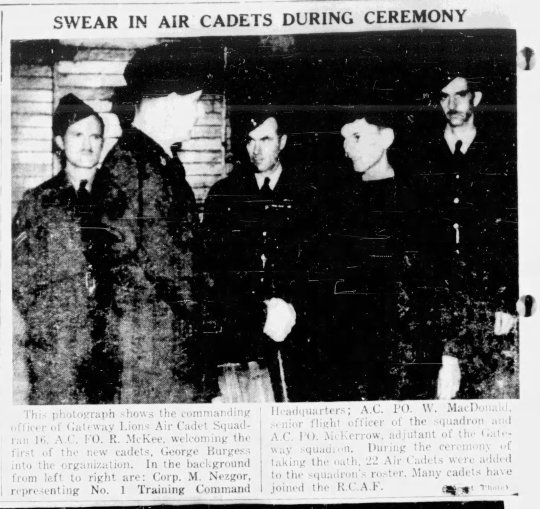
"SWEAR IN AIR CADETS DURING CEREMONY," North Bay Nugget. October 25, 1943. Page 1.1. ---- This photograph shows the commanding officer of Gateway Lions Air Cadet Squadron 16. A.C, FO. R. McKee, welcoming the first of the new cadets, George Burgess, into the organization. In the background from left to right are: Corp. M. Nezgor, representing No. 1 Training Command Headquarters; A.C. PO. W. MacDonald, senior flight officer of the squadron and A.C. PO. McKerrow, adjutant of the Gateway squadron. During the ceremony of taking the oath, 22 Air Cadets were added to the squadron's roster. Many cadets have joined the R.C.A.F.
#north bay#royal canadian air force#air cadets#military recruitment#air training#pilot training#canada during world war 2#northern ontario
0 notes
Text
When does LoTF take place? By a history major
Hi I'm a history major who thinks way too much about historical accuracy in novels and so i wanted to talk about when lotf took place (realistically). I wrote this in one of my essays on the novel, but I'll paraphrase so I don't bore people to death.
Lord of the Flies was written in 1952 and published in 1954.
In an early version of Lord of the Flies, Piggy says to Ralph "Didn't you hear what the pilot said? About the atom bomb? They're all dead." Furthermore, at some point the boys see a crater in the forest and compare it to the crater that "a bomb" could make.
These quotes alone automatically rule out the chance of the novel taking place in the 40s, when World War II was occurring. The boys would have grown up knowing the war and war effort, but their evacuation has absolutely nothing to do with the second world war. in fact, the first atomic bomb wasn't tested until 1945, long after British schoolkids would have been evacuated for WWII since germany started bombing england in september of 1940. also germany didn't have access to atomic bombs.
why would british schoolkids evacuate? well, england and america were very close allies and not long after america detonated their bombs, the soviet union made and tested their atomic bombs. this began the cold war. america and england are allies, and england is pretty anti-communism at this time.
so the book takes place anywhere around 1947 to 1952, when the novel was being written. probably the 1950s though.
what war is it? it's the cold war. the book assumes that the cold war heated up for lack of a better term, and countries like england and probably america by association, were bombed and evacuated planes of people.
there's more! kids were mostly evacuated by train within england itself after german bombings started, so the same can only be assumed for what they'd do in a nuclear war. only a small number were sent away by plane to places like canada, australia, and anywhere close to there, so that means the boys were very special and their parents probably would have wanted them to be sent away because it was quite the opportunity!
they would have died by the way. if an atom bomb went off anywhere near the plane, they would have been incinerated on the spot. maybe that's why he decided to cut it.
would their dads have served? well, ralph's dad definitely did so it's possible. england did call on all men ages 18 to 41 to draft themselves. however, married men, especially married men with children (dependents) did not take priority (they weren't even drafted until '43!) and they took many more single and young men. so while it's likely some of their parents served, having all of their dads serve is just unrealistic historically.
this places ralph, as a 12 year old boy and one of the oldest, born anywhere between 1935 and 1942, depending on when you think the book takes place.
farewell from your local history major 🫡
116 notes
·
View notes
Text

Silver Fox Louis AU
🩶 Gray hair is our forever by beardyboyzx @beardyboyzx (1k, G)
Harry put his lips together and his smile became bashful, one hand coming back in Louis' hair to caress it lovingly. He had seen Louis' first gray hair. His boyfriend was growing older and Harry was there to see it happening. "You've got one gray hair," he said, voice wet but full of wonder, as if that hair was made out of pure silver. "Your first gray hair."
🩶 HOT TO GO! by allwaswell16 @allwaswell16 (2k, T)
When Harry does something weird at the barricade, he leaves Louis’ show devastated and hoping he can somehow make things right. Or the accidental pervert fic
🩶 I'll Still Feel the Same Around You by crinkle-eyed-boo @crinkle-eyed-boo (2k, E)
He finds himself wishing that the bedsheet would slip down a few more inches so he could get a good look at Harry’s perfectly pert– Louis’ breath hitches as his cock stirs, suddenly very interested in this train of thought. Oh. Oh. The answer to all of Louis’ troubles is so fucking obvious he can’t believe he didn’t think of it until now. Nothing puts him to sleep like a good orgasm. Louis finds the cure for his insomnia in the form of his husband.
🩶 Figure This Out by haztobegood @haztobegood (2k, E)
Louis is everything Harry could have imagined when he’d typed “silver fox enthusiast” into his Grindr profile. Too bad he's probably scared Louis off by giving him too many expensive gifts.
🩶 The Referral by disgruntledkittenface @disgruntledkittenface (5k, E)
Louis has noticed that since he turned fifty, his sex drive has started to slow down. Unfortunately, that’s not the case for his younger boyfriend Harry. A problem solver by nature, Louis wants to do something special for Harry, to show him how much he appreciates him even after ten years together. When he suggests getting a referral for a sex worker to give Harry what he hasn’t been lately, it doesn’t take long for Harry to agree. And then they meet Tom.
🩶 'Sup by MediaWhore @mediawhorefics (7k, G)
Gemma really wants her little brother to sign up for a dating app and get back in the game after a messy divorce. Harry thinks he’s way too old to swipe. They compromise to devastatingly embarrassing results. Meanwhile, all Louis wants is to finish the play he’s been commissioned to write, but one of the regulars at his local coffee shop keeps distracting him. ft. older larry, pushy gemma, harry being a disaster gay and silver fox louis.
🩶 Someone to Fly Home To by kingsofeverything @kingsofeverything (35k, E)
Louis. 55 year old pilot who wants someone to fly home to. Harry swipes right. Or Louis and Harry’s marriage ended more than a decade ago, but fate keeps bringing them back together.
🩶 That's What I'm Here For by taggiecb @taggiecb (46k, E)
Louis Tomlinson is a dairy farmer on a tiny farm in eastern Canada. His wife of nearly thirty years has left him and his children are all grown up and out of the house. Louis needs help running his business but has no idea where to even start looking. Luckily for him his children know just the man for the job.
🩶 The Devil and the Deep Blue Sea by kingsofeverything @kingsofeverything (109k, E)
Louis’ life is steady and calm, moored by his marriage, and tied to his hometown, but after a chance encounter with another man, it’ll never be the same.
🩶 You Make Lovin' Fun by homosociallyyours @homosociallyyours (110k, E)
Harry is a 28 year old travel writer at a gay magazine who gets the assignment to go a lesbian cruise. She figures it's a nice chance to have some fun in the sun, but she's not expecting much else-- even if her partner and best friend are both encouraging her to hook up with someone while she's there. When she locks eyes with a gorgeous silver fox from across the room, she starts to think she could've been wrong. There are lots of things standing in the way of anything real happening with her and Louis, but that doesn't stop them from falling for one another. True love isn't always easy, but they do make lovin' fun.
86 notes
·
View notes
Text
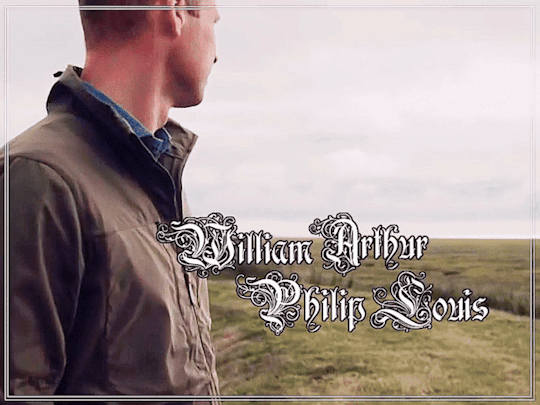
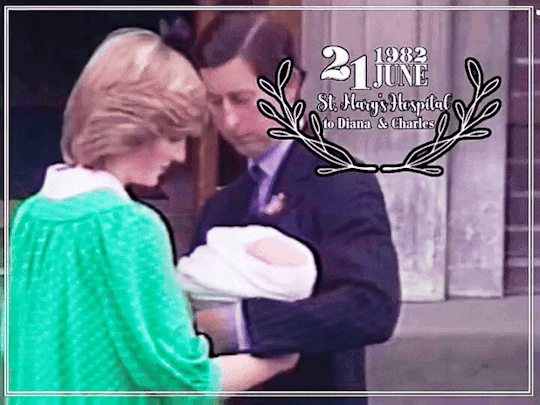







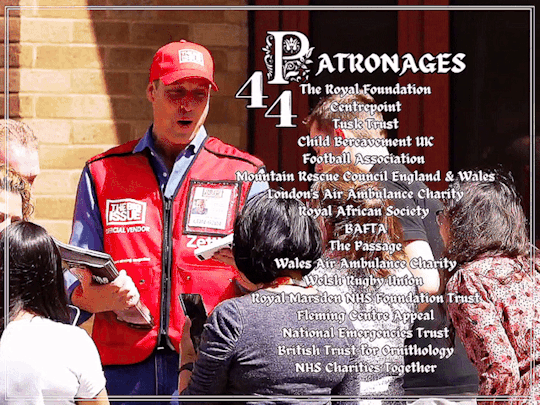
HAPPY 42ND BIRTHDAY TO HRH THE PRINCE OF WALES, WILLIAM ARTHUR PHILIP LOUIS ♡
On 21 June 1982, Prince William was born to Diana and Charles, then known as Prince and Princess of Wales in St Mary's Hospital, London, at at 21:03 BST. He was born during the reign of his paternal grandmother Elizabeth II and was the first child born to a Prince and Princess of Wales since Prince John's birth in July 1905.
The little prince's name was announced on 28 June as William Arthur Philip Louis. Wills was christened in the Music Room of Buckingham Palace by the then Archbishop of Canterbury, Robert Runcie, on 4 August.
William studied at Jane Mynors' nursery school and Wetherby School in London before joining Ludgrove. He was subsequently admitted to Eton College, studying geography, biology, and history at the A-level.
The Prince undertook a gap year taking part in British Army training exercises in Belize, working on English dairy farms, and as part of the Raleigh International programme in southern Chile, William worked for ten weeks on local construction projects and taught English.
In 2001, William enrolled at the University of St Andrews, initially to study Art History but then changed his field of study to Geography with the support of the love of his life Catherine Elizabeth Middleton who he met while at school.
Will and Cat fell in love during their time at uni, and married at Westminster Abbey on 29 April 2011. The couple have three adorable cupcakes Prince George (b.2013), Princess Charlotte (b.2015) and Prince Louis (b.2018). The family of five divide time between their official residence, Kensington Palace and their two private residences - Amner Hall & Adelaide Cottage.
After university, William trained at the Royal Military Academy Sandhurst. In 2008, he graduated from the Royal Air Force College Cranwell and joined the RAF Search and Rescue Force in early 2009. He transferred to RAF Valley, Anglesey, to receive training on the Sea King search and rescue helicopter, which made him the first member of the British royal family since Henry VII to live in Wales.
During his active career as a Search and Rescue Pilot, William conducted 156 search and rescue operations, which resulted in 149 people being rescued. He then served as a full-time pilot with the East Anglian Air Ambulance starting in July 2015, donating his full salary to the EAAA charity.
Working with all branches of the military, he holds the ranks of Lieutenant Colonel in the Army, Commander in the Navy and Wing Commander in the Air-Force
Upon their wedding, WillCat became HRH The Duke and Duchess of Cambridge, The Earl and Countess of Strathearn and Baron and Lady Carrickfergus. He became the heir apparent on 8 September 2022, receiving the titles of the Duke of Cornwall & The Duke of Rothesay. William & Catherine were made The Prince and Princess of Wales by Kimg Charles on 9 September 2022. Additionally, William also became the Prince & High Steward of Scotland, Earl of Chester, Earl of Carrick, Lord of the Isles, and Baron Renfrew.
As well as undertaking royal duties in support of The King, both in the UK and overseas, The Prince devotes his time supporting a number of charitable causes and organisations with some of his key areas of interest being Mental health, Conservation, Homelessness, Sports and Emergency Workers.
He has undertaken several overseas trips representing the monarch, covering a wide array of countries like Australia, Canada, Namibia, Malaysia, South Africa, Tanzania, Pakistan Italy, Jordan, Kuwait, France, India, The Bahamas, Belize, Afghanistan etc ; He is also is also a founder of various initiatives like United For Wildlife, Heads Together, Earthshot and Homewards.
#happy birthday william ❤️#william's 42nd birthday#prince of wales#the prince of wales#prince william#william wales.#william prince of wales#british royal family#british royals#royals#royalty#brf#royal#british royalty#catherine middleton#kate middleton#duchess of cambridge#2024 wales birthdays#prince george#princess charlotte#prince louis#royaltyedit#royalty gifs#royalty edit#royaltygifs#my gifs#21062024
173 notes
·
View notes
Text
Happy Trans Day of Visibility!
Transgender Day of Visibility is recognized internationally each year on March 31st. Today, we celebrate the strength, joy, and resilience of transgender, Two-Spirit, non-binary and gender diverse people across the globe. Let’s continue to stand up, show support, and create a world of respect and equality for all– not just today, but every day!
As anti-trans legislation spreads and attacks on healthcare, sports, and basic rights increase, we must stand in solidarity with our trans siblings. If you’re itching to make a real difference for our trans community today (and honestly, every day), why not consider donating to some of these amazing organizations that are doing such vital work? Your generosity would be greatly appreciated!
Point of Pride focuses on helping vulnerable members of the queer community feel seen and have access to life-saving health and wellness programs and supports like their Annual Transgender Surgery Fund, their HRT Access Fund, Free Chest Binders + Free Femme Shapewear and more! They have awarded almost half a million dollars in direct financial assistance and donated thousands of gender-affirming garments to trans youth and adults in all 50 American states and around the world. Donate to Point of Pride here!
FOR THE GWORLS is a Black, trans-led collective that curates parties to fundraise money to help Black transgender people pay for their rent, gender affirming surgeries, smaller co-pays for medicine/doctor’s visits, and travel assistance. There’s two donation options for this collective: the rent assistance fund and the medical assistance fund. Take your pick~!
G.L.I.T.S is a Black, trans-led advocacy and direct services organization that is dedicated to fighting systemic discrimination against marginalized communities, in New York City and beyond. Founded in 2016, G.L.I.T.S addresses barriers faced by community members at the intersection of gender, race, and class through direct services, advocacy, mass mobilization, media engagement, and public education. Their initiatives include sustainable housing projects and plans for a dedicated health clinic, all documented as pilot projects for broader application– you can read all about their initiatives here and donate to them here!
El/La Para TransLatinas works towards a world where TransLatinas are protected, celebrated, and loved, where trans/intersex/gender diverse Latinx people are welcome, safe, represented and valued in all spheres of life. They envision a future in which the human rights to migration, housing, healthcare, food, and safety are respected and protected. For more than 30 years, El/La has been an advocate in the transgender community seeking justice for translatinas. They were THE first translatina HIV prevention program in Northern California. Donate to them here~!
TGEU (Trans Europe and Central Asia) is a trans-led nonprofit for the rights and wellbeing of trans people in Europe and Central Asia. TGEU was founded in 2005 under the name Transgender Europe e.V. Since then, they’ve established themselves as a legitimate voice for the trans community. In 2018, they expanded their regional scope to include Central Asia. TGEU now serves trans people in over 50 countries in Europe and Central Asia. TGEU envisions a world free from discrimination where gender diversity is celebrated, where trans people are valued, and where trans movements are self-aware, intersectional, and evolving to meet the needs of a diverse and resilient community. You can donate to them here.
Egale is a Canadian charity advocating for equal societies and systems free from homophobia, transphobia and all forms of oppression. Founded in 1986, the organization recently replaced “LGBTQ+” with the acronym “2SLGBTQI” in recognition of “Two Spirit” people. In 2023, Egale’s work included six research reports, 75 workplace inclusion trainings and 120+ resources in French and English. Egale envisions a Canada, and ultimately a world, without homophobia, biphobia, transphobia, and all other forms of oppression so that every person can achieve their full potential, free from hatred and bias. See their mission, values, history and more here and donate to Egale here!
41 notes
·
View notes
Text
Summaries under the cut
Stardust by Neil Gaiman
Young Tristran Thorn will do anything to win the cold heart of beautiful Victoria—even fetch her the star they watch fall from the night sky. But to do so, he must enter the unexplored lands on the other side of the ancient wall that gives their tiny village its name. Beyond that old stone wall, Tristran learns, lies Faerie—where nothing not even a fallen star, is what he imagined.
Where the Red Fern Grows by Wilson Rawls
Billy, Old Dan, and Little Ann—a boy and his two dogs...
A loving threesome, they ranged the dark hills and river bottoms of Cherokee County. Old Dan had the brawn, Little Ann had the brains—and Billy had the will to train them to be the finest hunting team in the valley. Glory and victory were coming to them, but sadness waited too. And close by was the strange and wonderful power that's only found...
The Witches by Roald Dahl
This is not a fairy-tale. This is about real witches. Real witches don't ride around on broomsticks. They don't even wear black cloaks and hats. They are vile, cunning, detestable creatures who disguise themselves as nice, ordinary ladies. So how can you tell when you're face to face with one? Well, if you don't know yet you'd better find out quickly-because there's nothing a witch loathes quite as much as children and she'll wield all kinds of terrifying powers to get rid of them.
The Kane Chronicles by Rick Riordan
Since his mother's death six years ago, Carter Kane has been living out of a suitcase, traveling the globe with his father, the brilliant Egyptologist, Dr. Julius Kane. But while Carter's been homeschooled, his younger sister, Sadie, has been living with their grandparents in London. Sadie has just what Carter wants—school friends and a chance at a "normal" life. But Carter has just what Sadie longs for—time with their father. After six years of living apart, the siblings have almost nothing in common. Until now.
On Christmas Eve, Sadie and Carter are reunited when their father brings them to the British Museum, with a promise that he's going to "make things right." But all does not go according to plan: Carter and Sadie watch as Julius summons a mysterious figure, who quickly banishes their father and causes a fiery explosion.
Soon Carter and Sadie discover that the gods of Ancient Egypt are waking, and the worst of them—Set—has a frightening scheme. To save their father, they must embark on a dangerous journey—a quest that brings them ever closer to the truth about their family and its links to the House of Life, a secret order that has existed since the time of the pharaohs.
Hatchet by Gary Paulsen
Brian is on his way to Canada to visit his estranged father when the pilot of his small prop plane suffers a heart attack. Brian is forced to crash-land the plane in a lake--and finds himself stranded in the remote Canadian wilderness with only his clothing and the hatchet his mother gave him as a present before his departure.
Brian had been distraught over his parents' impending divorce and the secret he carries about his mother, but now he is truly desolate and alone. Exhausted, terrified, and hungry, Brian struggles to find food and make a shelter for himself. He has no special knowledge of the woods, and he must find a new kind of awareness and patience as he meets each day's challenges. Is the water safe to drink? Are the berries he finds poisonous?
Slowly, Brian learns to turn adversity to his advantage--an invading porcupine unexpectedly shows him how to make fire, a devastating tornado shows him how to retrieve supplies from the submerged airplane. Most of all, Brian leaves behind the self-pity he has felt about his predicament as he summons the courage to stay alive.
Island of the Blue Dolphins by Scott O'Dell
On San Nicolas Island, dolphins flash in the surrounding blue waters, sea otter play in the vast kelp beds, and sea elephants loll on the stony beaches. Here, in the early 1800s, a girl named Karana spent eighteen years alone.
Karana had to contend with the ferocious pack of wild dogs that killed her younger brother, constantly guard against Aleutian sea otter hunters, and maintain a precarious food supply. Her courage, self-reliance, and grit has inspired millions of readers in this breathtaking adventure.
Stargirl by Jerry Spinelli
Leo Borlock follows the unspoken rule at Mica Area High School: don't stand out--under any circumstances! Then Stargirl arrives at Mica High and everything changes--for Leo and for the entire school. After 15 years of home schooling, Stargirl bursts into tenth grade in an explosion of color and a clatter of ukulele music, enchanting the Mica student body.
But the delicate scales of popularity suddenly shift, and Stargirl is shunned for everything that makes her different. Somewhere in the midst of Stargirl's arrival and rise and fall, normal Leo Borlock has tumbled into love with her.
The Phantom Tollbooth by Norton Juster
For Milo, everything’s a bore. When a tollbooth mysteriously appears in his room, he drives through only because he’s got nothing better to do. But on the other side, things seem different. Milo visits the Island of Conclusions (you get there by jumping), learns about time from a ticking watchdog named Tock, and even embarks on a quest to rescue Rhyme and Reason! Somewhere along the way, Milo realizes something astonishing. Life is far from dull. In fact, it’s exciting beyond his wildest dreams. . . .
Black Beauty by Anna Sewell
As a young horse, Black Beauty is well-loved and happy. But when his owner is forced to sell him, his life changes drastically. He has many new owners—some of them cruel and some of them kind. All he needs is someone to love him again....
Whether pulling an elegant carriage or a ramshackle cab, Black Beauty tries to live as best he can. This is his amazing story, told as only he could tell it.
Tuck Everlasting by Natalie Babbitt
Doomed to - or blessed with - eternal life after drinking from a magic spring, the Tuck family wanders about trying to live as inconspicuously and comfortably as they can. When ten-year-old Winnie Foster stumbles on their secret, the Tucks take her home and explain why living forever at one age is less a blessing that it might seem. Complications arise when Winnie is followed by a stranger who wants to market the spring water for a fortune.
#stardust#where the red fern grows#the witches#the kane chronicles#hatchet#island of the blue dolphins#stargirl#the phantom tollbooth#black beauty#tuck everlasting
103 notes
·
View notes
Text
7x03 analysis part 1 — Everything Air Ops
I promised helicopters, so now we get helicopters. I want to look into how Air Operations work in the 9-1-1 universe, in comparison to its real life counterpart in this first part. Then, I will try to figure out the location and intensity of "hurricane Ethel" during the clandestine operation in the second part. And finally, I will prove how risky it is to fly a helicopter into a storm and why Tommy deserves every bit of his Medal of Valor.
Location
Real!LAFD Air Ops operate (Station 114) out of Van Nuys Airport (VNY/KVNY). It's not only one the busiest general aviation airports in the world, it's also smack dab in between major green areas of the city of LA itself.

This location makes perfect sense in real life. Air Ops might get the occasional highway car wreck or urban structural fire calls, but most of their missions still consist of wildfire suppression and rural search and rescue. Being based at Van Nuys makes sure they can respond to emergency in a timely fashion.
in the 9-1-1 universe, the LAFD Air Ops are based at "Harbor Station", or Station 217. (Harbor and 217 are the same station, Chimney especially asked if Tommy was still at the 217 in 2x14 when requesting air support, unless the 911-verse LAFD has 2 different air operation units, which I highly doubt.) Obviously it has to be at an airport, because that's where the hangers and helipads are, and going by "harbor" I can only speculate that it's in the Harbor Region of LA.

The only non-military airport in the LA Harbor Region is Long Beach Airport (LGB/KLGB), but it's quite a busy commercial airport, probably not a good one to run emergency services from. There's also the Zamperini Field (TOA/KTOA) nearby in Torrance, although not exactly inside the Harbor Region, it's coastal and close enough to the 2 LA ports I guess? Feel free to create a whole new airport using your imagination though, as you know 9-1-1 is set in an alternate universe where geography and physics work differently.
Helicopters
The LAFD Air Ops have 5 medium (FIRE 1-5) and 2 light duty (FIRE 6/7) helicopters, you've heard Tommy in 7x04. Everything applies to the real world counterpart, but the medium type that real!Air Ops operate is AgustaWestland AW139, the Italian-made medium sized twin-engine helicopter with a 5-blade main rotor primed for emergency response and off-shore oil rig transportation.
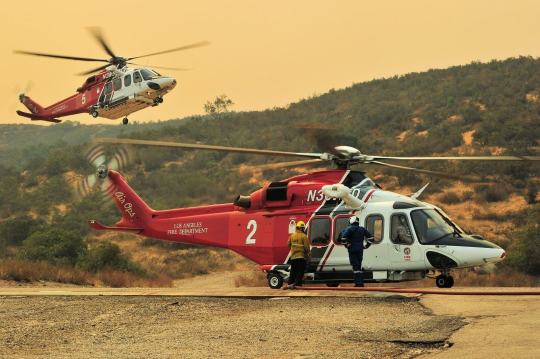
It has auto-pilot, an anti-icing system for harsh weather and even auto-hover suitable for hoist rescue missions. In a passenger transport configuration, it can carry up to 15 passengers in a 3 row seating plan. In an SAR (search and rescue) configuration though, the middle row can be removed for gurney space. It's big and powerful enough to transport multiple patients, but at the same time, light and agile enough to get into difficult terrain.
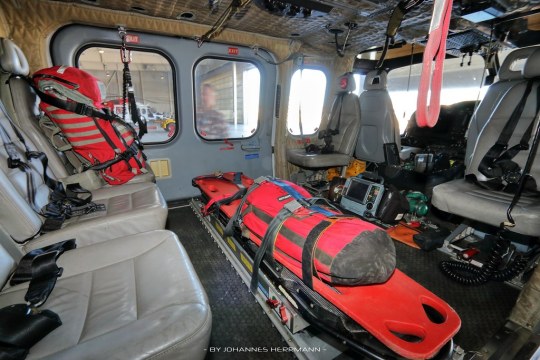
The AW139 is designed to be flown by 2 pilots, flying solo is also possible, but only under VFR (Visual Flight Rules), with an additional certification, which LAFD pilots can and do. To fly it under IFR (Instrument Flight Rules), it always requires 2 pilots according to the FAA last time I checked.
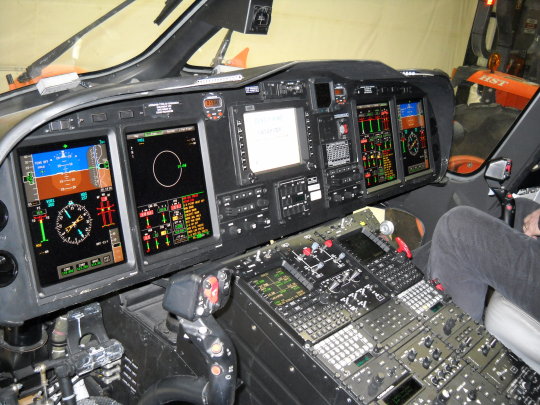
The light helicopter type real!LAFD flies is the Bell 505 Jet Ranger X, a single engine twin-blade made in Canada. It's an relatively new airframe, set to replace the aging Bell 206, which the LAFD used to operate. It's quite a bit smaller than the AW139, it can only fit 1 pilot and 4 passengers.
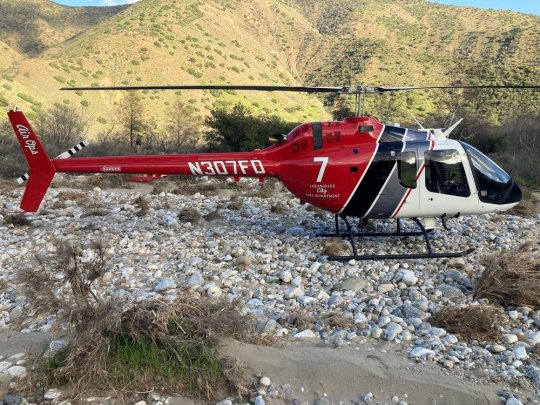
While it's perfectly capable of carrying a Bambi bucket to assist with aerial firefighting missions, it's mainly used as a training aircraft for new pilots and HLCO (Helicopter Coordinator) when there is a major catastrophe that requires on-the-site air traffic coordination.
These are all brand new and sophisticated aircrafts that a mere TV channel can't get their hands on without a government budget. So for 911!LAFD Air Ops, ABC went to their usual helicopter service company for prop aircrafts.
Helinet Aviation provides all sorts of helicopter services from aerial journalism, medevac, delivery to regular chartering. All the 911!Air Ops scenes in 7x03 and 7x04 are naturally filmed in the Helinet hanger, for convenience's sake, at VNY, just a runway across from real!Air Ops.
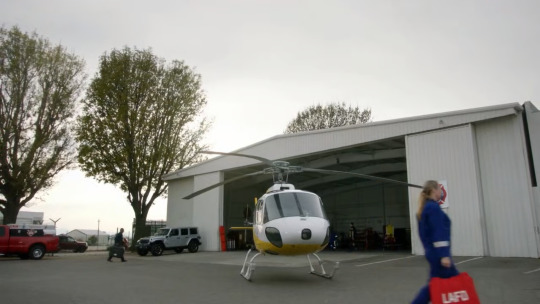
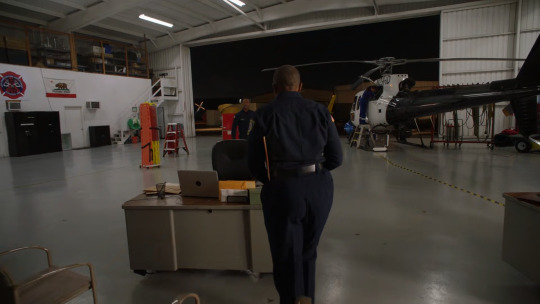
911!Air Ops

Helinet hangar Street View
I believe I've identified all the helicopters shown in 7x03 and 7x04, but let's get the 2 in the background which probably do not belong to 911!Air Ops out of the way:
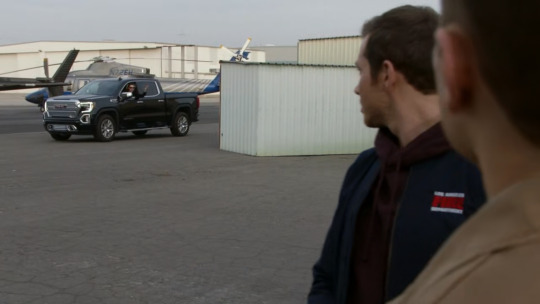
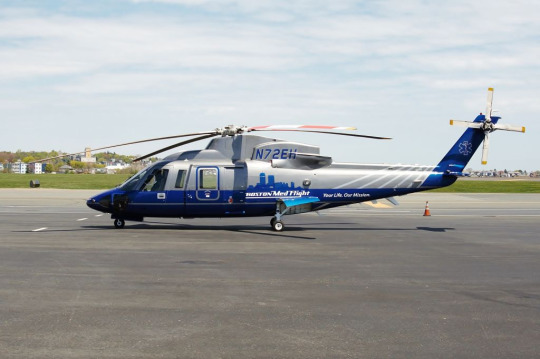
N72EH, a Sikorsky S76C++, still in its Boston MedFlight livery. Sold to Helinet in 2022, possible used as a medevac vehicle currently? Unlikely to have anything to do with 911!Air Ops, probably just happened to be in the background to make it seem like there were many helicopters.

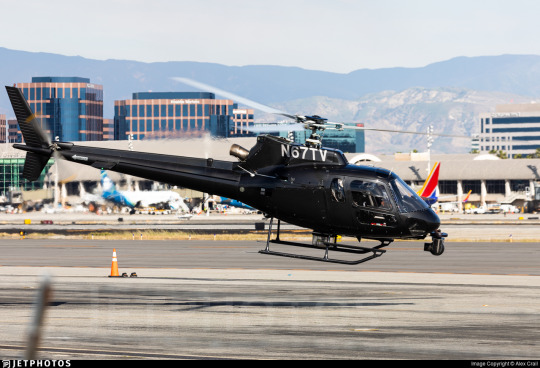
The one Tommy flies Eddit to Vegas in is N67TV, an Eurocopter AS350B2 Écureuil (aka squirrel). No fire department would ever let employees take their expensive equipment out for a joy ride so it's likely that in universe, Tommy rented it from somewhere outside of the station. IRL though, according to this forum post, it's used as a backup helicopter for all its customer news stations, but also any TV or film production purposes outside of journalism.
Now, for the one seen in the hangar, therefore explicitly belonging to 911!LAFD:

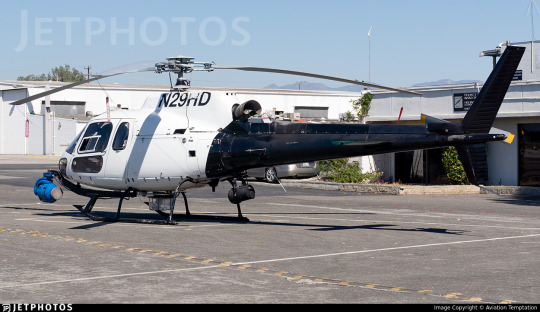
N29HD, also an AS350B2, also a news helicopter. According to this reddit comment, it used to be shared between CBS and FOX, but now it seems to be configured as a dedicated aircraft for ABC7.
The one the who cares gang stole to rescue Bobby and Athena though has a fake registration number on it:
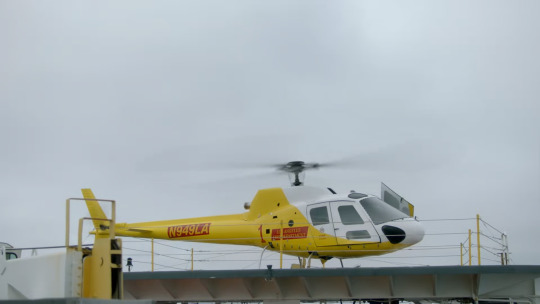
You just have to look up Helinet's fleet, and you will see this is obviously a DHL livery, and it's quite easy to find out that this is actually:
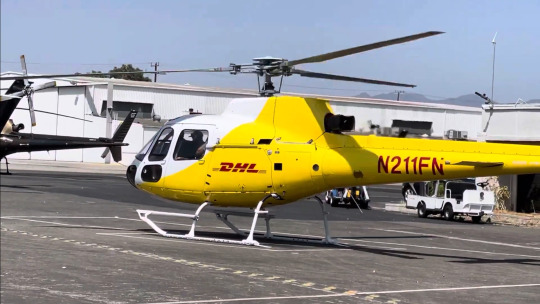
N211FN, an AS350B1 (so an even older variant than the previous two), operated on behalf of DHL for package delivery service.
Don't get me wrong, the AStar (how the AS350 is called in the US) is a versatile and reliable aircraft. It the 4th most produced rotorcraft in the world, someone even managed to land one on top of Mount Everest. But it's kind of small? It can seat only up to 5 passengers with 1 pilot, and there is hardly room left for any gear. There is also no space for stretcher, so anyone they rescue would have to sit upright. It's just not very realistic.
I have no idea what medium duty helicopters 911!Air Ops operate, we're unlikely to see them in the future. There is this Bell 205 in 4x12 Treasure Hunt, but it clearly says L.A County Rescue on the tail.
youtube
Pilots
Real!Air Ops pilots wear beige flight suits, it's the aeromedics who wear blue, and helitac crews wear orange. I'm not complaining too much though, Tommy looks good in blue. (I think the chief pilot wears dark blue, but I'm not sure.)
Helicopter pilots in general usually wear helmets, in case a particularly strong pocket of turbulence slams you against the body of the aircraft, or a bird decide to fly through the windshield into your face, but I get that it gets in the way of the camera, so I'm just gonna enjoy Tommy's beautiful face.
Real!Air Ops pilots work on a 24/48 shift schedule just like any platoon firefighters. Due to the danger of pilot fatigue on aviation safety, they do try to limit their continuous flight time to 6 hours before taking a prolong break.
There are 5 levels of pilots: pilot I (trainee), pilot II (probational), pilot III (full pilot), pilot IV (lead pilot) and pilot V (chief pilot). The chief pilot oversees the entire Air Ops and work on a 10 hour per day, 4 days a week schedule. The rest of the pilots are put into 3 shifts, each shift with a pilot IV, 2 pilot IIIs and 2 trainees/probies, together with 4 aeromedics. (Can't find the most updated version, the lastest one I can get my hands on is from 2022, so good enough?) Therefore Tommy's Bobby would not be a captain, it would be a lead pilot.
I've already explained in detail the timeline of Tommy's career as a firefighting pilot, but here is the short version of it: Once accepted into the LAFD pilot training program, he would have to train with the LAPD for 180 hours then back to the LAFD for 200 hours, that takes around 2 years, and by then he would be a probie. After that, he would have to slowly build up flight hours then train and certify for all types of missions on the medium duty helicopter, that would take another 2-3 years, and after that he would be promoted to a pilot III, which is probably the rank he holds now.
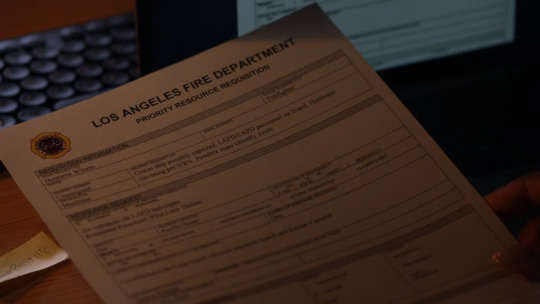
We can see from the form Hen submitted in 7x03 that she initially asked for Lucy as their pilot, as she's forgotten that Tommy also worked there. Fortunately Chimney called Tommy, as Lucy most likely would've still been a probie if not just a trainee.
Melton
I have no idea who he is.
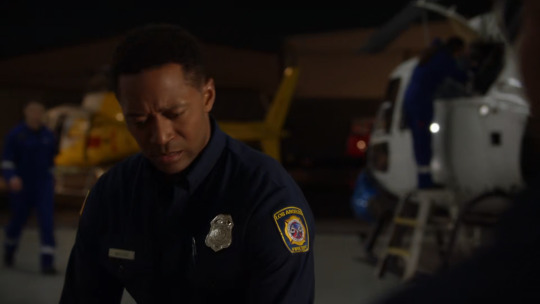
I can sort of see his badge says "firefighter"? At real!Air Ops, everyone wears a flight suit as uniform, so that they can hop into a chopper in an emergency. I don't know what a dude in a regular uniform with the regular LAFD patch on his arm doing there.

Tommy's arm has the Air Ops helicopter patch on it.
Real!Station 114 though do have a crash unit staffed with regular firefighters, maybe Melton is with them? But then, why is he doing with Hen's helicopter requisition?
#911 abc#911 on abc#911 show#911 meta#tommy kinard#tagging the ship for fic writing reasons#bucktommy#tevan#kinley
110 notes
·
View notes
Text
Become a Professional Pilot in Canada with Flying Star Aviators

The allure of soaring through the skies, navigating through the clouds, and experiencing the world from a bird's eye view is a dream cherished by many. If you're passionate about aviation and aspire to become a professional pilot, Canada offers an excellent environment for flight training, combining advanced facilities, diverse weather conditions, and vast airspace. Flying Star Aviators is a prominent name in this field, offering comprehensive pilot training programs that can turn your dream into reality. Here’s a detailed look at how you can become a professional pilot in Canada with Flying Star Aviators.
Why Choose Canada for Pilot Training?
World-Class Training Facilities: Canada is home to some of the world's best flight schools equipped with modern training aircraft and simulators.
Diverse Weather Conditions: Training in various weather conditions helps build robust flying skills, making pilots versatile and prepared for any situation.
High Standards of Safety and Regulation: Canadian aviation regulations are among the most stringent globally, ensuring that pilots trained here adhere to the highest standards of safety.
Ample Airspace: Canada’s vast and less congested airspace offers an ideal environment for flight training, allowing for extensive practice and experience.
About Flying Star Aviators
Flying Star Aviators is renowned for its commitment to excellence in aviation training. With a team of experienced instructors, state-of-the-art facilities, and a structured curriculum, Flying Star Aviators stands out as a premier choice for aspiring pilots.
Training Programs at Flying Star Aviators
Flying Star Aviators offers a range of training programs designed to cater to different stages of a pilot’s career:
Private Pilot License (PPL): The first step in your aviation career, the PPL program, provides foundational knowledge and skills in flying. This license allows you to fly solo or with passengers, but not for commercial purposes.
Commercial Pilot License (CPL): This program is aimed at those who wish to pursue flying as a profession. It includes advanced training in flight maneuvers, navigation, and emergency procedures, qualifying you to work as a commercial pilot.
Instrument Rating (IR): Instrument rating is essential for flying in adverse weather conditions. This program teaches you how to rely on instruments for navigation and control, significantly enhancing your flying capabilities.
Multi-Engine Rating (MER): This program equips you with the skills needed to operate multi-engine aircraft, a crucial requirement for many commercial flying jobs.
Instructor Rating: For those who wish to teach flying, this rating is essential. It focuses on developing instructional skills and techniques to effectively train new pilots.
The Training Experience
1. Experienced Instructors: At Flying Star Aviators, you will learn from seasoned pilots who bring a wealth of knowledge and practical experience. Their mentorship is invaluable in helping you develop the skills and confidence needed to excel.
2. Modern Fleet: The academy boasts a modern fleet of training aircraft, ensuring that you get hands-on experience with the latest aviation technology.
3. Comprehensive Ground School: Ground training is a critical component of pilot education. Flying Star Aviators offers detailed ground school courses covering subjects like aerodynamics, meteorology, navigation, and aviation regulations.
4. Simulator Training: Advanced flight simulators provide a safe environment to practice and perfect various flight scenarios and emergency procedures.
5. Personalized Training Plans: Recognizing that every student is unique, Flying Star Aviators offers personalized training plans tailored to your individual needs and pace of learning.
Admission Process
Application: Submit an online application form through the Flying Star Aviators website.
Medical Examination: Pass the required medical examination to ensure you meet the health standards for pilots.
Entrance Exam: Clear the entrance exam, which tests your knowledge in subjects like mathematics and physics, as well as your English proficiency.
Interview: Attend a personal interview to discuss your motivation, goals, and suitability for the training program.
Career Opportunities
Upon completing your training with Flying Star Aviators, you will be well-prepared for a variety of career opportunities in the aviation industry:
Commercial Airlines: Work as a pilot for major or regional airlines, flying passengers to destinations around the world.
Cargo Operations: Fly cargo planes, transporting goods and materials across vast distances.
Charter Flights: Operate private charter flights, offering personalized flying experiences to clients.
Flight Instruction: Teach aspiring pilots, passing on your knowledge and passion for aviation.
ConclusionBecoming a professional pilot in Canada with Flying Star Aviators is a journey that combines rigorous training, expert mentorship, and unparalleled experiences. The academy’s commitment to excellence ensures that you are not just trained to meet industry standards but to exceed them, positioning you for a successful and rewarding career in aviation. Take the first step towards your dream and soar to new heights with Flying Star Aviators.
#pilot training#pilot training in canada#best pilot training#commercial pilot#how to become a pilot#pilot#airline pilot salary#dgca ground classes#dgca cpl classes#pilot requirements#atpl
1 note
·
View note
Text
some '23 rookies + mike lore under the cut because my lovely friend casey made the terrible decision of asking me about their lore and i did all this whoops
ok so. here’s what i’ve got for you (the lore or at least my knowledge of it isn’t as deep as joe’marr but like, what is.) so obviously as the name implies, chase, charlie, and yoshi (Andrei whose last name gets consistently mispronounced to sound kind of like yoshi and the nickname has stuck) were drafted in 2023. charlie was drafted as a 4th round WR and yoshi as a 6th round WR from PRINCETON. this is interesting in itself because a lot of people were like….why on earth are the bengals drafting two wide receivers and honestly valid point lol. but are we drafting to build a solid football team OR are we drafting to craft beautiful romantic narratives?? rare bengals FO W!
anyway, it’s also interesting because charlie (nicknamed chuck sizzle lmao) had a great reputation as a WR at purdue and once he was drafted in the 4th, yoshi was like :( :( i guess that means i’m not going to the bengals. (he also thought he’d be drafted much earlier lol but while his stats were good, the fact that he was in the ivy league and they don’t play Real Football there worked against him, also he was a Huge Track Star in college too and could have been in the Olympics. and i guess some teams thought that meant he wasn't as committed to football). and ironically, he’s turned out to be much better and more reliable than charlie! (who just can’t seem to stay on the field cuz of injuries, but when he IS on the field he’s a great punt returner!) despite all that, they were very fast friends and definitely became close first.
chase brown has a sad tragic backstory that the nfl loved talking about in the lead up to the ’23 draft. he’s a twin (his brother plays defense/special teams on the eagles! already got a ring!!) and they grew up in canada with a single mother who could very rarely make ends meet for them. but, the twins got Discovered in high school and were sent off to some fancy football high school in florida i think, where they stayed with a very Stable God Loving Football Loving Family who they think of as their second parents :’) so much so that chase actually almost didn’t pursue football in college! and went to a school that wasn’t great at football but was good at….airplane pilot training? i guess the dad of this family was a pilot and chase wanted to be just like him 🥹 (we loveeeee a Father Figure Complex). so because sydney (his twin) wasn’t Crazy, he immediately went to illinois where there’s an actual good football program. and eventually chase realized that the whole pilot school thing wasn’t actually for him and was like okay wait football right let me do that, and joined sydney at illinois where they could be teammates again <3 <3 and they were both very successful!
i believe sydney ended up getting drafted a few rounds earlier than him, which was obviously sad, but then if you watch the video of zac drafting chase they have a very touching moment :’) chase i think took a little longer to be part of charlie and yoshi’s early bff-ness just because they were in different position groups and also he got hurt for a good bit of his rookie year and i don’t think was around QUITE as much. (and his twin also seems to be a distant part of the group, he and chase talk on the phone almost every day! they tried to stop in the lead up to the bengals - eagles game this season but it was too hard 😔)
but anyways, those three became Very Very Good friends and all lived in the same building (although i think chase may have moved because he had a kid a month ago….) and all their girlfriends are besties too and they basically hang out alllll the time. last offseason, chase and yoshi (but not charlie 😔) went to atlanta together to train with a coach that helped both of them with receiving (because zac told them they both needed to work on that lol, you’d think yoshi wouldn’t as much as chase but! princeton!) and there was lots of social media of them working out together and then drinking and partying together, and they’re doing that this offseason too! (although this time chase brought his gf and kid, so perhaps slightly less partying will occur. but more uncle time!)
then in ’24 we signed mike g as a free agent, who basically had been tossed around the league for most of his career :( he was drafted by the dolphins and did alright there, but then got franchise tagged and not utilized particularly well. he signed with the patriots and also wasn’t used well there! so luckily for us, the rest of the league didn’t really believe in him and we got him for cheap (ideal bengals signing lol). some notable Lore here: mike was apparently part of the “Burrow Bowl” which was a game late in the 2019 season between the bengals and dolphins, where the loser would be in position to draft Joe, who was already the most likely first pick of the draft. and mike scored two TDs that game! helping the dolphins get a win (but really, a loss, thanks mike!!!) mike also went viral one time on the dolphins for doing an absolutely Terrible Griddy to the point that ja’marr had to comment on it on twitter laughing at him <3 and that’s since become a bit of a joke between them <3 (they did a lovely griddy together this year after one of mike’s TDs where ja’marr could barely do it he was laughing so hard lol). anyway! that’s mike, he’s a tall, goofy, lovable guy (who also, according to one anonymous reddit user, has a HUGE dick and apparently such a high stamina that one of the girls he hooked up with in college had to use an ice pack the next day 🥲 which has led some of us to believe that maybe that’s why he needs to have multiple partners. for everyone’s sake 🥲)
mike really found his groove on the bengals, like many a TE before him (this next season is actually going to be the first year joe has had the same TE two years in a row! normally they do so well with him that they price themselves out of the bengals range lol but i guess mike wanted to stay! for his boyfriends???) and also instantly clicked with the ’23 rookies, which is funny because he’s definitely older than them but 100% has the exact same sense of humor. they are always together in every social media video put out by the bengals (and also were shown watching games together at each others' places during hard knocks). they are also CONSTANTLY commenting weird shit on each others posts on instagram (please just look through them or go through my tags for them lol and see). the rest of the team has obviously noticed this and the social media people made them a photoshopped picture of the four of them together in the Step Brothers pose that yoshi has since hung in his apartment <3 which is adorable.
but okay oh man this got long and is probably way more than you wanted. again i recommend looking through my tags for them and enjoying all their goofy shit :’) mike getting the extension just worked out so well for them to have many more Moments together and i’m soooo excited about that (if nothing else in the upcoming season at this point lol).
#also sorry for no sources this is all off the dome because im a Crazy Person and this is the information my brain chooses to retain#sorry if some of it might be a little inaccurate but i think this is all correct?#someone correct me if not!#man you really asked me about lore at the right time i’m apparently in a very chatty mood!#oh god i guess i'm gonna tag them using their real names just so i can find this again#sorry to everyone#here let me put#nfl rpf#in case anyone has that filtered#anyway#mike gesicki#andrei iosivas#charlie jones#chase brown
29 notes
·
View notes
Text
Tokitae & Kiska

Reading about the history of these two orcas was a lot to take in, and they're not the only two who went through these experiences. The story of Tokitae absolutely broke me.
Trying to summarize it without somehow lessening the importance is also a challenge. I don't want to make this into some kind of depressive spiral, but I also feel its important to share, you know?
The picture itself was to show how small and dirty their tanks were, though they didn't live near each other (Kiska in Canada, and Tokitae was in Miami) the pattern was pretty much the same, wasnt it?
Kiska
Kiska was captured in 1979 in the North Atlantic Ocean when she was about three years old. She was sold to Marineland in Canada, alongside another killer whale named Keiko who was later sold to an aquarium in Mexico (wild fact: that is the same Keiko who starred in Free Willy)
She was kept for breeding purposes and had five calves in total, all who died too soon. Marineland made a deal with Seaworld, to borrow one of their orca males as a breeding partner for Kiska. But he was too young at the time and so the park owners decided it would be a chance for the two to bond first. Things were taking too long and Seaworld wanted their orca back, and Marineland refused. The issue was taken to court and Sea World won, and their orca was flown back to their park. It would be the last killer whale Kiska would ever see. From 2011 up to her death in 2023 she remained completely isolated in her tank. She was nicknamed the World's Loneliest Orca ;__;
In 2019, the Canadian Parliament passed the Ending the Captivity of Whales and Dolphins Act which made Kiska the last orca in captivity in Canada. Besides banning future attempts of putting cetaceans in captivity, the act also prohibits animals still in captivity to be used for entertainment or breeding purposes.
A man named Phil Demers, also called the Walrus Whisperer, brought attention to the conditions Kiska lived in. Videos of her swimming in circles, floating aimlessly, and even bashing her head against the tank walls went viral. Kiska's situation sparked a lot of conversation about the treatment of killer whales in captivity. Orcas are extremely intelligent and emotionally complex animals who live in social groups and this turned a spotlight on the cruelty of the industry and a call to figure out more humane solutions.
Unfortunately help didn't come fast enough for Kiska, and she passed away from a bacterial infection in March 2023. The biggest issue was coming up with ways to provide sanctuaries for whales and dolphins still in captivity. Groups like the Whale Sanctuary Project are working to model a seaside sanctuary in Nova Scotia for orcas and other cetaceans who can't go back into the wild. Sea Life Trust in Iceland has created the first beluga sanctuary with with Whale and Dolphin Conservation, and their first residents (named Little White and Little Grey) arrived back in spring of 2020.
Tokitae
She had a similar story like Kiska. She was a southern pacific killer whale who was captured in the 70's when she was only three or four, then she was shipped to a seaquarium in Miami. There she was penned with a male orca named Hugo who was caught a couple of years earlier. For a time they were kept separated in fear they wouldn't get along. But Hugo was also a pacific resident and when they were heard calling to each other they were put together.
Over the years she was trained and performed with Hugo. Tokitae's name was changed to Lolita, according to he owners they "didn't want people to know where she came from." She also became pregnant several times but Tokitae never delivered a live calf.
In 1980 Hugo died from a brain aneurysm and despite that, Tokitae was pushed to perform. It was said she would look for Hugo but the owners brushed it off saying she got over the loss. Since then the seaquarium had her paired off with several tank companions including a pilot whale, a risso's dolphin, a short beaked common dolphin and several pacific white sided dolphins.
In 2019 the Luumi Nation called for Tokitae's release. They gave her the name Sk'aliCh'elh-tenaut which meant that she is a member of Sk’aliCh’elh, the resident family of orcas who call the Salish Sea home. And two Luumi women invoked the Native American Graves Protection and Repatriation Act (NAGPRA) which calls for the protection and return of Native American human remains, funerary objects, sacred objects, and objects of cultural patrimony.
The Luumi Nation consider killer whales to be their kin, therefore Tokitae belonged with them and in her natal waters in the Salish Sea. Several members of the Luumi Nation made comparisons of Tokitae's situation to that of native children being stolen and indoctrinated. It was their duty to bring her back.
The Miami Seaquarium came under legal fire in 2021. A 17 page report was released by the USDA about the conditions Tokitake and other cetacean residents were living under. Such as ignoring the vet's advice in letting Toki rest, instead the trainers continued to make her perform high energy behaviors which ended up causing Tokitae to injure her jaw. Both she and the dolphins were fed rotting fish. And Toki developed eye injuries due to the highly chlorinated water in the tank.
In 2022, The Dolphin Company took full ownership of the Miami Seaquarium, and Tokitae was retired and taken off display, mainly to help her recover from the jaw injury she sustained earlier. Then in 2023, the seaquarium partnered with an organization called Friends of Tokitae to return her to the Salish Sea. With the guidance of the Luumi Nation the plan was to build a sea pen which would take 18 to 24 months. Tokitae would be safe, but never be wild again, as the main concern was acclimatizing her and the dangers of exposing any infections or diseases she carried to the already endangered pacific resident orcas.
But like Kiska, Tokitae passed away in her tank in August of 2023 due to old age and other chronic illnesses she had. She spent over fifty years in captivity. Her ashes were given to the Luumi Nation and they were taken to a sacred spot and spread in a traditional water ceremony in September.
It was said the southern resident killer whales came together in a super pod the day Tokitae died.
#my art!#tw animal abuse#tw animal death#orca#killer whales#tokitae was captured in what was considered the worst whale capture event but i didnt want to write about it#if youre curious look up the penn cove orca captures but watch out its abysmal#orcanomics
15 notes
·
View notes
Text
Frontline RCMP officers in seven British Columbia communities are set to join a national pilot project to introduce body-worn cameras to the force. B.C. RCMP Staff Sgt. Kris Clark said officers working in Ucluelet, Ahousaht, Tofino, Mission, Prince George, Cranbrook and Kamloops will receive training before incorporating the cameras into day-to-day operations. "This part of the training is to ensure that they know when the camera should be activated and when it should be deactivated," said Clark. "Also in line with that [are] certain privacy regulations." Officers will wear the cameras on their chest in a visible place. Clark said the cameras will display a red light when they are recording.
Continue Reading.
Tagging: @newsfromstolenland
#Police body cameras#Body cameras#british columbia#canadian#cdnpoli#canada#canadian politics#canadian news#RCMP
30 notes
·
View notes
Text
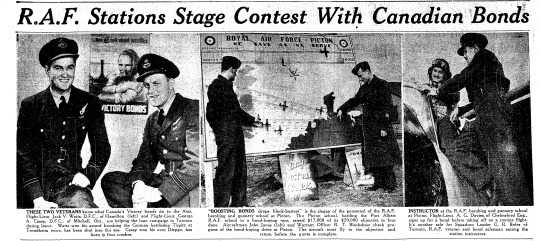
"R.A.F. Stations Stage Contest With Canadian Bonds," Toronto Star. April 29, 1943. Page 3. ---- THESE TWO VETERANS know what Canada's Victory bonds do to the Axis. Flight-Lieut. Jack V. Watts, D.F.C., of Hamilton (left) and Flight-Lieut. George A. Casey, D.F.C., of Mitchell, Ont., are helping the loan campaign in Toronto during leave. Watts won his award bombing the German battleship Tirpitz at Trondheim twice, has been shot into the sea. Casey won his over Dieppe, has been in four crashes.
"BOOSTING BONDS drops block-busters" is the slogan of the personnel of the R.A.F. bombing and gunnery school at Picton. The Picton school, battling the Port Albert R.A.F. school in a bond-buying race, raised $17,000 of its $20,000 objective in four days. Aircraftman John Jones (left) and Warrant Officer R. T. Blackshaw check progress of the bond-buying drive at Picton. The aircraft must fly to the objective and return before the quota is complete.
INSTRUCTOR at the R.A.F. bombing and gunnery school at Picton, Flight-Lieut. A. G. Davies, of Chelmsford Eng.. signs up for a bond before taking off on a routine flight. It's another sale for Squadron Leader G. R. Boles of Toronto, R.A.F. veteran and bond salesman among the station instructors.
#victory bonds#victory bond campaign#toronto#hamilton#picton#flight lieutenant#royal canadian air force#royal air force#commonwealth air training plan#pilot school#war propganda#canada during world war 2
0 notes